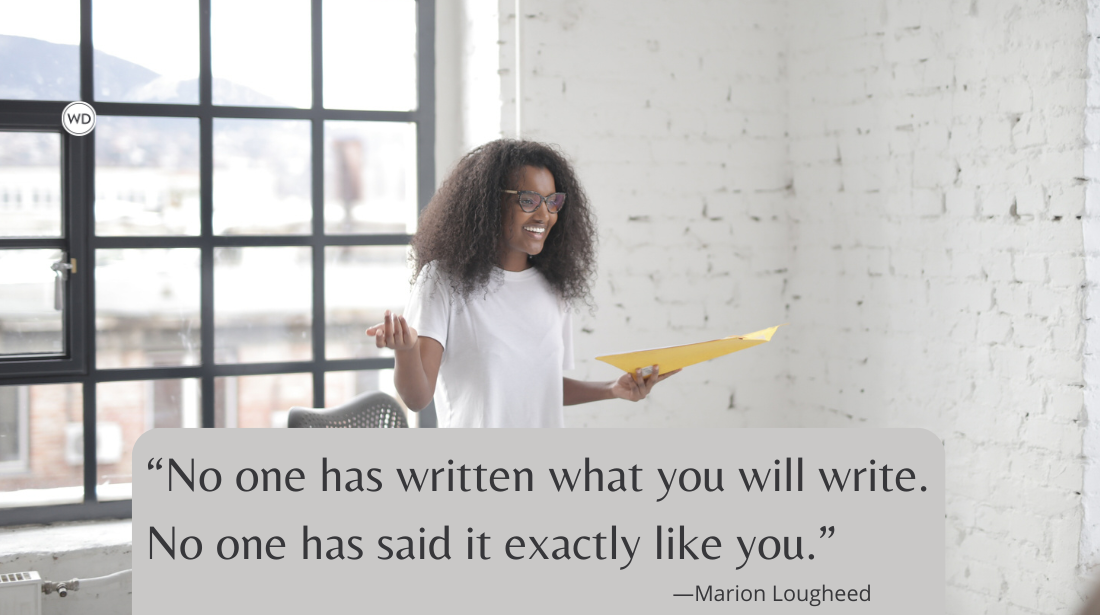Maggie Smith: Creativity Is Our Birthright As Human Beings
In this interview, New York Times-bestselling author and poet Maggie Smith discusses the 10 ingredients to creativity that make up her new book, Dear Writer.
Maggie Smith is the award-winning, New York Times bestselling author of eight books of poetry and prose, including You Could Make This Place Beautiful, Good Bones, Goldenrod, Keep Moving, and My Thoughts Have Wings. A 2011 recipient of a Creative Writing Fellowship from the National Endowment for the Arts, Smith has also received a Pushcart Prize, and numerous grants and awards from the Academy of American Poets, the Sustainable Arts Foundation, the Ohio Arts Council, the Greater Columbus Arts Council, and the Virginia Center for the Creative Arts. She has been widely published, appearing in The New Yorker, The Paris Review, The Nation, the New York Times, the Atlantic, The Best American Poetry, and more. You can follow her on Bluesky, Facebook, and Instagram, and find her online MaggieSmithPoet.com.
In this interview, Maggie discusses the 10 ingredients to creativity that make up her new book, Dear Writer, her advice for other writers, and more.
Name: Maggie Smith
Literary agent: Joy Tutela, David Black Literary Agency
Book title: Dear Writer: Pep Talks & Practical Advice for the Creative Life
Publisher: Washington Square Press/Atria
Release date: April 1, 2025
Genre/category: Nonfiction
Previous titles (if any) by the author: You Could Make This Place Beautiful (New York Times bestselling memoir, 2023); My Thoughts Have Wings (children’s picture book, 2024); Goldenrod (poetry, 2021); Keep Moving: Notes on Loss, Creativity, and Change (essays, 2020); Good Bones (poetry, 2017); The Well Speaks of Its Own Poison (poetry, 2015); Lamp of the Body (poetry, 2005)
Elevator pitch: In Dear Writer, Maggie Smith distills creativity and the craft of writing into a practical guide perfect for fans of Elizabeth Gilbert’s Big Magic and Anne Lamott’s Bird by Bird.Smith breaks down creativity into ten essential elements—attention, wonder, vision, play, surprise, vulnerability, restlessness, tenacity, connection, and hope—and explores each element through short, inspiring essays and generative writing prompts that artists of all experience levels can apply to their own creative practices.
What prompted you to write this book?
I love craft books and books about creativity, and my shelves are full of them. I return to them again and again, teach from them, and refer students to them, so it’s long been a dream to write one of my own—a practical, accessible, encouraging guide. At the core of Dear Writer is a belief that creativity is our birthright as human beings. Yes, all of us. Our lives are endlessly expandable, and creativity is the great expander. When you read a poem or listen to a song or watch a play, you’re not the same person afterwards. You’re slightly rearranged. Your DNA is still the same, your fingerprints are still the same, you look the same in the mirror, but you aren’t exactly who you were. I believe we all deserve not only to experience that kind of transformation but to create it for ourselves.
How long did it take to go from idea to publication? And did the idea change during the process?
I wrote and submitted the first draft of this book in 2020. When I sold and started writing my memoir, You Could Make This Place Beautiful, we decided to publish that book first. Coming back to Dear Writer in 2023, I found that I wanted to completely reconceive the book with a new idea: the 10 ingredients in creativity’s “secret sauce.” So, I rewrote this book between mid-2023 and early 2024, inspired by this new structure. I’m so glad that I went with my gut instinct on that, and that my publisher was willing to trust me and go along for the ride. Working with Jenny Xu on this book was a joy.
Were there any surprises or learning moments in the publishing process for this title?
Permissions are always a challenge when using excerpts and quotes, and this book has plenty of both. I’m grateful to Ifeoma Anyoku at Atria, who was incredibly helpful through that process. In the end, I quoted other writers but used only my own poems and prose as example texts. One, it was easier and much less expensive than using work by others; and two, it allowed me to give readers that peek behind the curtain and talk about how these pieces came to be.
Were there any surprises in the writing process for this book?
One of the wonderful surprises was realizing how much overlap there is not only across genres but across various art forms. Looking at the 10 elements of creativity I selected—attention, wonder, vision, play, surprise, vulnerability, restlessness, tenacity, connection, and hope—helped me see the ways they show up in visual art, performance, music, and other media. What artists do, regardless of the form our art takes, isn’t that different. The creative process is messy, exhilarating, and for us all.
What do you hope readers will get out of your book?
Dear Writer is full of pep-talks, craft tips, writing prompts, and revision strategies that readers can apply to art-making—if they’re writers, or painters, or filmmakers, or musicians. But I’ve found that anything that applies to writing also applies to life. Problem-solving is a creative act. Conversations are creative. Parenting is creative. Falling in love, leaving your job, changing your mind—all creative acts. I hope this book inspires people to create, but I also hope it helps them to see that creativity isn’t just about making art; it’s about how we live. Making your life is the ultimate creative act.
If you could share one piece of advice with other writers, what would it be?
The best piece of advice I’ve received about writing was from the poet Stanley Plumly, who was a friend and mentor of mine. He wrote to me, “Stay deep within yourself and stay alone there—that is where your poems come from, and that has nothing to do with an audience. You are the audience.”
My advice, based on Stan’s, is write for you first. Get it down, whatever it is, and try not to skip ahead; try not to imagine handing it off to someone else just yet. The longer you can stay inside yourself, in that quiet place where the writing comes from, the better. The longer you can keep that spell from breaking, the better.
Robert Lee Brewer is Senior Editor of Writer's Digest, which includes managing the content on WritersDigest.com and programming virtual conferences. He's the author of 40 Plot Twist Prompts for Writers: Writing Ideas for Bending Stories in New Directions, The Complete Guide of Poetic Forms: 100+ Poetic Form Definitions and Examples for Poets, Poem-a-Day: 365 Poetry Writing Prompts for a Year of Poeming, and more. Also, he's the editor of Writer's Market, Poet's Market, and Guide to Literary Agents. Follow him on Twitter @robertleebrewer.








